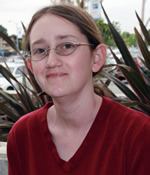CSUF Students Win Statewide Contest
Duo Beat Competition From All CSU Campuses in Two Divisions
June 3, 2008
By Mimi Ko Cruz

Jean Fiddler
Jean Fiddler's examination of Abraham Lincoln's views on God and Cori Knight's analysis of William Faulkner's opposing depictions of religion are among this year's winners in the annual California State University Student Research Competition.
Cal State Fullerton's Fiddler and Knight beat scores of competitors from all 23 CSU campuses in the Humanities and Letters — undergraduate and graduate student divisions, respectively.
Jean Fiddler
Fiddler, a senior majoring in history, used Lincoln's private and public documents to prove that he believed "God wanted slavery to end but was unsure about the North winning the Civil War." An excerpt from Fiddler's paper:

Cori Knight
"Throughout his career in the Illinois State Assembly, House of Representatives and the presidency, Abraham Lincoln frequently made references to God in his public addresses and private correspondences, but the fact that he was not a member of a church led some of his contemporaries, as well as historians, to suggest that Lincoln did not believe in God."
"However, there is abundant evidence to suggest that Lincoln had a strong belief in a divine being. Lincoln believed deeply in a higher power and in His ability to influence events on earth. … In 1859, he sent a message to his dying father through his stepbrother, in which he instructed him to 'tell him to remember to call upon, and confide in, our great, and good and merciful Maker; who will not turn away from him in any extremity.'
"These are clearly not the words of a doubter," she noted.
"Lincoln's hatred of slavery is directly related to his belief in a higher power. Throughout the 1850s, Lincoln could not publicly declare that slavery violated the will of God without appearing to be an extremist, but he continued to do so privately. In 1858, he wrote to his friend H.L. Pierce that 'those who deny freedom to others deserve it not for themselves, and, under a just God, cannot long retain it.' Throughout his career, Lincoln repeatedly argued that slavery was wrong because God disapproved of it. … Lincoln spent his career trying to reconcile his own religious views regarding slavery and the Union with the popular opinion on these subjects, and in his last two public addresses before his death he was finally able to speak freely and fully express his beliefs on both issues."
Fiddler, 21, of Fullerton, credits Megan Nelson, assistant professor of history, and Robert A. Young, associate vice president for graduate studies and research, for providing "invaluable assistance" during the research and writing of her paper.
Cori Knight
Knight, 24, of Placentia, said wining the CSU student research contest was "amazing" and credits Young and Chris L. Ruis-Velasco, associate professor, and Erin Hollis, assistant professor of English, comparative literature and linguistics, and comparative religion faculty members, for mentoring her as she wrote her winning paper.
An excerpt from her paper, "Writing in Conflict: Faulkner's Opposing Depictions of Religion":
"William Faulkner is considered one of the most famous American modernists and the premiere writer of the American South.
"While this lies at the core of his identity in the American literary canon, it also lies at the core of the conflict in his novels. Neither Faulkner nor his works can completely escape this paradoxical pull between modernism's revolutionary ideas and the powerful permutations of Christianity in the U.S. South. This pull, at times rather dramatic, presents itself in the discordant ways in which Faulkner depicts religion in his novels.
"Novels such as 'Light in August' depict a self-interested and selfish faith that motivates violent and cruel acts; novels like 'The Unvanquished,' on the other hand, illustrate a compassionate faith that drives characters to compassionate acts in service of a greater good. These extremes in Faulkner's depiction of Christianity in the characters in his novels relate back to his immersion in a culture that was deeply in conflict. …
"Faulkner lived and wrote in a climate of great conflict. Modernism's rise offered scientific and cultural advancements, as well as theological reconstructions, while Southern fundamentalism tried to remain a bulwark of traditional morality and Christianity, a last bastion of conservativism in what it perceived as a weakening world. Faulkner's works reflect the powerful conflicts between modernism and religion, and the characters in these works embody the positive and negative extremes possible in these two immensely influential spheres."
Knight and Fiddler were among 10 Cal State Fullerton students who presented their papers during the May competition at Cal State East Bay. They walked away with the top honors in two of the 19 divisions at the competition.

